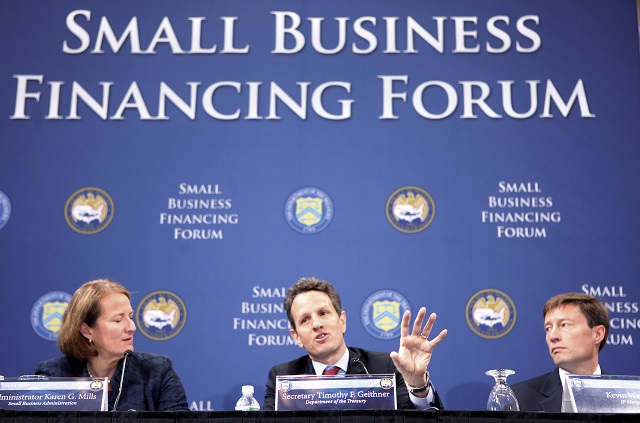
(AP Photo / Gerald Herbert)
Ever since Thomas Jefferson championed the “yeoman farmer,” Americans across the political spectrum have romanticized small businesses. Politicians tout Mom-and-Pop companies as the backbone of the economy. But, if you run the numbers, small businesses don’t live up to the hype, according to economist Robert D. Atkinson, co-author of the book “Big Is Beautiful: Debunking the Myth of Small Business.” Atkinson says that we should take a size-neutral approach to regulating businesses.
Three Takeaways:
- Big businesses outperform small businesses by almost every meaningful measure, Atkinson argues. That includes wages, employee benefits, diversity, and environmental protection.
- Large corporations are often criticized for pumping money into politics. Yet small businesses are also an extremely powerful force in Washington, represented by organizations like the National Federation of Independent Business. They are also helped by the efforts of a U.S. government agency, the Small Business Administration. As a result, small businesses benefit from relaxed regulations, access to government funding, and influence in every congressional district.
- Big businesses are under strict public and government scrutiny, so their mistakes can turn into national PR disasters (think BP’s Deepwater Horizon oil spill). But that kind of scrutiny isn’t necessarily a bad thing. It forces big businesses to comply with regulations and work to maintain a reputation as a responsible company.
More Reading:
- Even “trust-busters” like Teddy Roosevelt and FDR saw the benefit of large corporations, Robert Atkinson and Michael Lind write in The New Republic.
- Atkinson admits that the corporate wage premium is getting smaller. Researchers have a few theories about the downward wage trend, reports CNN Money.
- Politicians’ obsession with small businesses misses the big picture, to the detriment of small businesses themselves, argues historian Benjamin C. Waterhouse.
- How do the numbers stack up between big and small businesses? The magazine Inc. takes a look.

